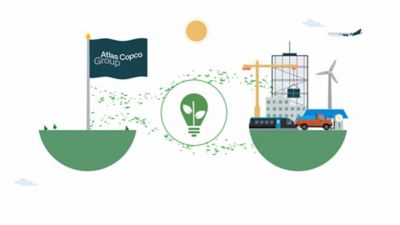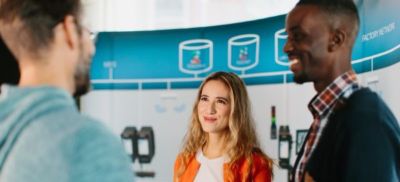Meet Marco Mele
Marco Mele likes to know how things work. As a child in Naples, Italy, he would carefully dismantle radios, figure them out and finally put them back together. Today, his thirst for knowledge helps him finds new ways to simulate manufacturing processes.
Job: Industrial Engineering Manager, Semiconductor Service, Vacuum Technique
Specialist Subject: Manufacturing today and tomorrow
“I want to understand how things work on a deeper level, and I think that comes through in many aspects of my work. I still have that curiosity.”
As part of his role, Marco has been tasked with ensuring Atlas Copco Service Technology Centres (STC) are standardized so the equipment inside works at its best.
Designing the Centres, which are part of our Vacuum Technique Business Area (VTBA), requires expertise from fields spanning architecture, engineering and manufacturing.
Until recently, drafts of plans moved back and forth between the groups, at times creating a long and complex process.
Moving to a virtual world
Now everything can be created in a virtual world. Atlas Copco Group teams can drag and drop equipment into a digital model facility, moving components around until they find the right balance.
It’s just one way the Group is utilizing digital twins and standardization to optimize the business and provide a better service to customers, Marco says.
Right at the beginning, we can find a layout that ensures we have the right flow, so we can go to the architects and say ‘please build around this’
“It’s so much easier because they already have the information about various technologies and the important constraints, so we have an open and more efficient communication channel,” Marco continues.
Simulate today – be prepared tomorrow
The digital modelling doesn’t end with the design of STCs. Marco and the team use similar technology to simulate manufacturing processes, allowing the organization to model various scenarios, like changes in demand.
“On top of the 3D mockup, we can implement a process flow that matches whatever outcome the customer needs,” Marco says.
There might be a target output, or constraints on money, time, or space. If we know that a customer’s volumes must go up by 50% next year, we can simulate it today so everybody understands what’s going to be required and can be prepared.
The better the data, the better the forecasts. Marco and his team are continuously gathering data from the STCs so their process simulations can be refined and improved.
Our experts can leverage machine learning and artificial intelligence to analyze the database in real time, enabling it to gather data from ongoing processes before instantly using the results to refine future processes.
“Processes can be linked, even if they aren’t obviously related, and we are now ensuring they communicate digitally,” he adds.
“It’s a little like the communication that takes place between the brain and the lungs – we don’t decide how to breath optimally, the data just goes back and forth, and it shifts to suit its environment. We are creating a similar ecosystem with our data.”
Listen to Marco on TechTalks
Marco Mele was a guest on the first ever episode of the TechTalks podcast, where we discussed how to engineer the industry of tomorrow.




